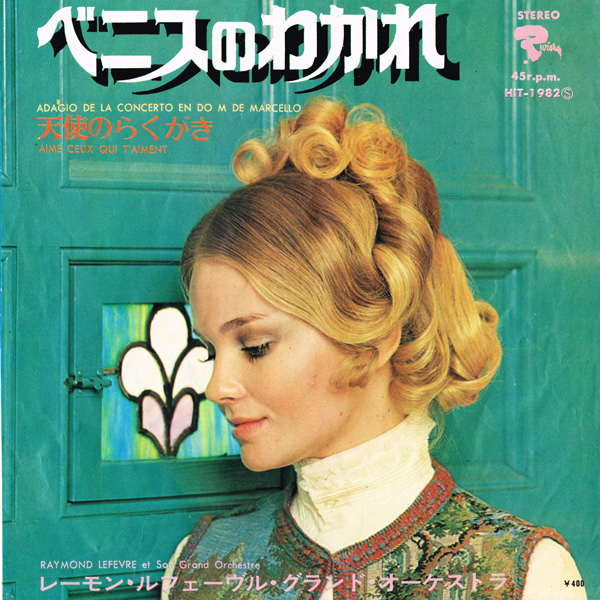45 R.P.M.: MAMY BLUE

HIT-1982 S, King Record Co. Ltd., Japan. '72-3. Recorded by Riviera (France).
- Adagio de la Concerto en Do M de Marcello (2:35) (Arrgt. R. Lefevre)
- Aime Ceux Oui T'aiment (2:45) (P. Carli, Potiomkin)
SLEEVE NOTES:
The most romantic and romantic Lefebvre sound, Raymond Lefebvre and his Grand Orchestra will be coming to Japan. Considering his popularity and reputation in Japan, this visit to Japan is rather overdue. I remember that his records were introduced to Japan around 1967, and when I first heard his sound, I felt a sense of liveliness and dynamism that was different from the mood music of the past. Since then, his orchestras, along with Paul Mauriat's, have gradually become popular among easy listening fans, and now have a reputation as the most contemporary easy listening.
The Raymond Lefebvre sound is characterized by a combination of the fluidity and stylishness of French chansons and the beat of rock music, which is the mainstream of contemporary popular music. His sound, which is not merely beautiful mood music, but also skillfully expresses a sense of beat, evokes a youthful, modern vitality that has made him popular among young pop music fans. The romanticism of the Parisian spirit and the modern sense symbolized by the rock beat will give listeners fresh impressions and a pleasant sense of ease.
Lefebvre originally began his musical studies with the intention of becoming a classical flutist, but while playing jazz in clubs as a part-time job, he became fascinated by the appeal of popular music and entered this field. In 1956, he formed his own grand orchestra and began to play an active role, providing arrangements and accompaniment for many singers. A few years later, he arranged and backed the then up-and-coming singer Dalida's "Ciao Ciao Bambina," which was a big hit and brought him much attention, and he went on to arrange for many famous French singers. In 1968, his easy listening version of "Âme Câline," a song written by Michel Polnareff, made the U.S. hit parade and made him famous worldwide. In Japan, the song "The Queen of Sheba" became a hit in the spring of 1969 and won the hearts of Japanese fans, and has since then been popular today, riding the wave of the rise of French pop music and the love sound.
Adagio de la Concerto en Do M de Marcello:
The Italian film "The Anonymous Venetian," depicts the love and eternal separation of a conductor and his estranged wife. The final scene of the film is a moving performance of "Adagio de la Concerto en Do M de Marcello." The original is the "Oboe Concerto" by Marcello, an 18th century composer. Recently, there has been a lot of talk about pop classical music, in which classical numbers are arranged in a pop-easy listening style, and this piece is one such example. Lefebvre takes this sad and beautiful melody and adds strings and other heavy sounds to it. The rhythm section in the background and the use of brass give the song a very modern feel.
Aime Ceux Oui T'aiment:
A hit song by the French pop fairy Danielle Vidal, she captured the hearts of Japanese pop music fans with this 1969 song. Lefebvre effectively uses the harpsichord and electric bass to transform the cuteness of Vidal's "mischievous angel" into the orchestral sound he is best known for.
Shigeki Kato
Recorded by RIVIERA, France
Note: Translation made by online translator.
